【2025-2026学年人教九全英语情境教学课件内嵌音视频】Unit 1 Section B 2a~2e(情境:主题班会——如何才能成为优秀的学习者?)
文档属性
| 名称 | 【2025-2026学年人教九全英语情境教学课件内嵌音视频】Unit 1 Section B 2a~2e(情境:主题班会——如何才能成为优秀的学习者?) | 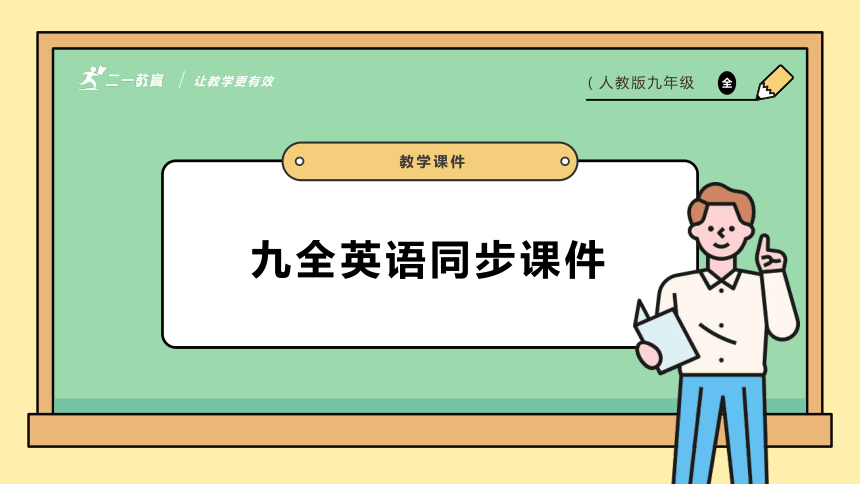 | |
| 格式 | pptx | ||
| 文件大小 | 14.9MB | ||
| 资源类型 | 试卷 | ||
| 版本资源 | 人教新目标(Go for it)版 | ||
| 科目 | 英语 | ||
| 更新时间 | 2025-08-01 17:26:45 | ||
图片预览

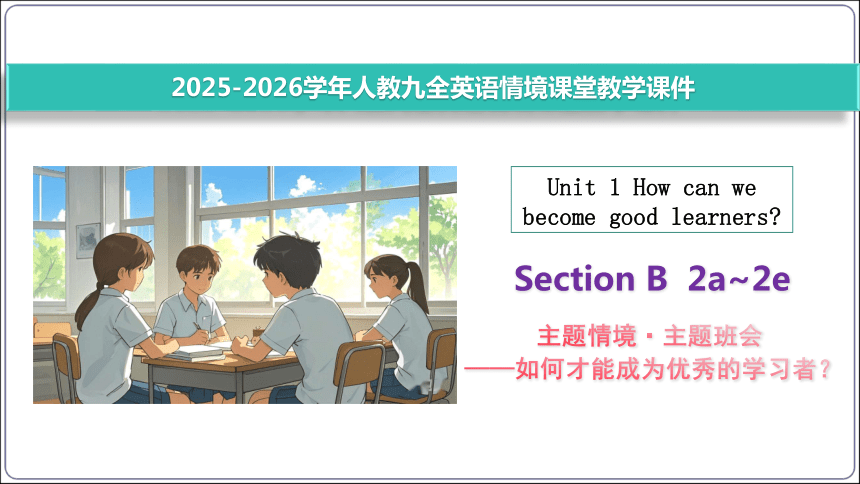
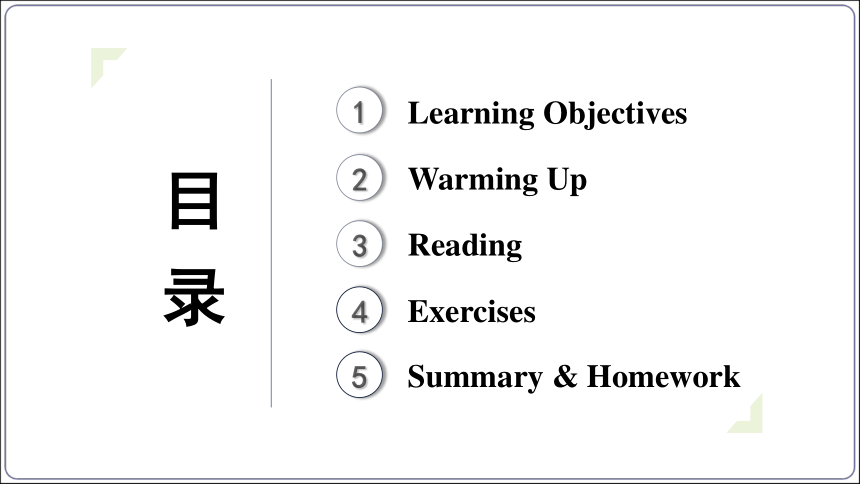
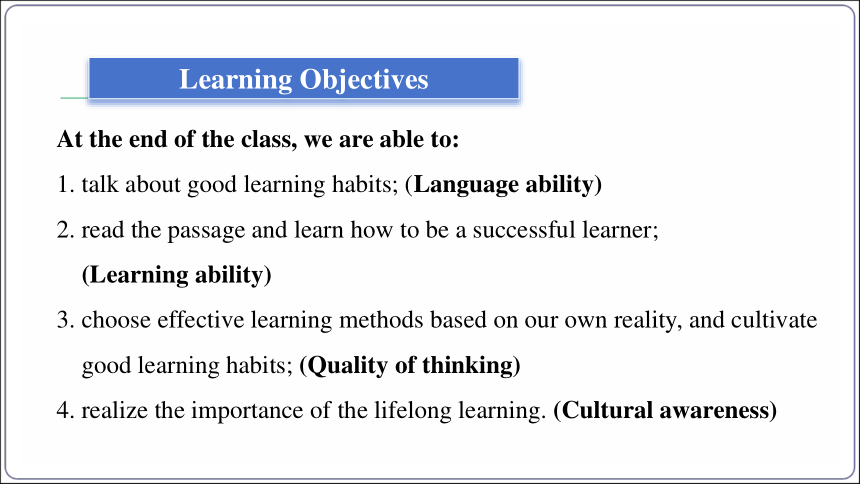
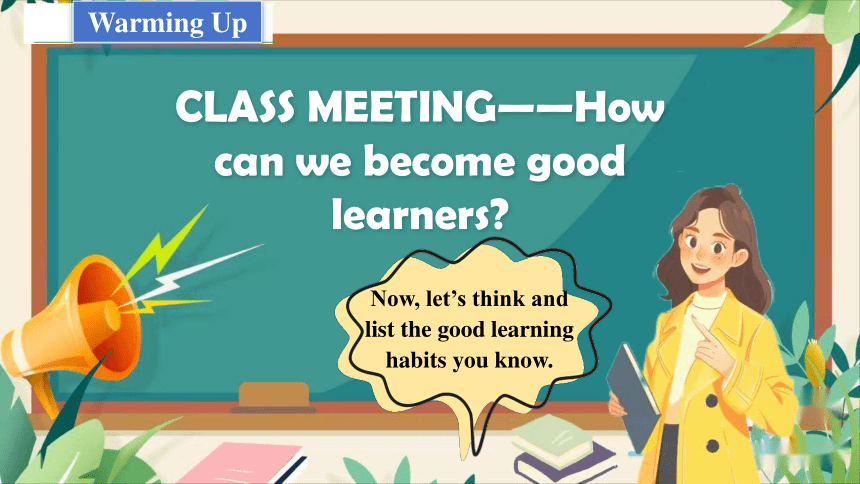
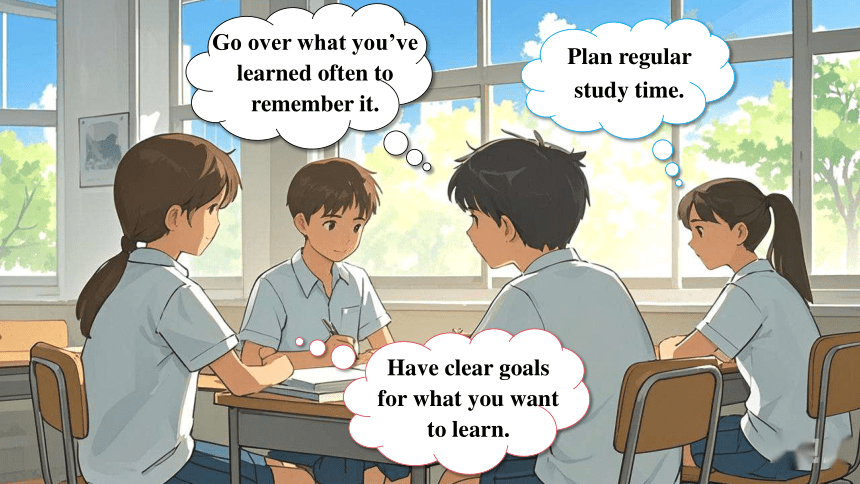
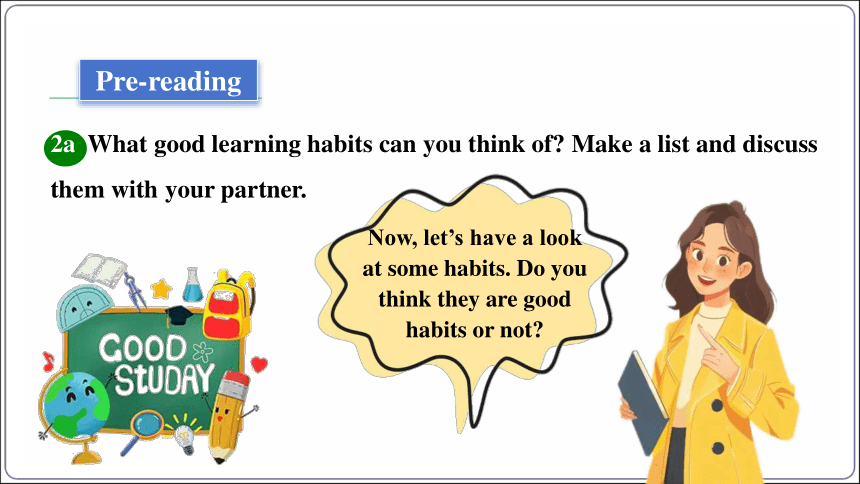
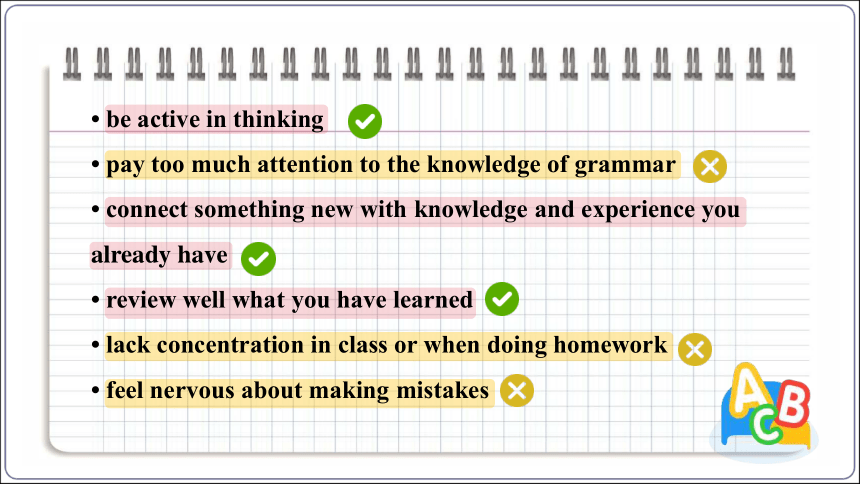
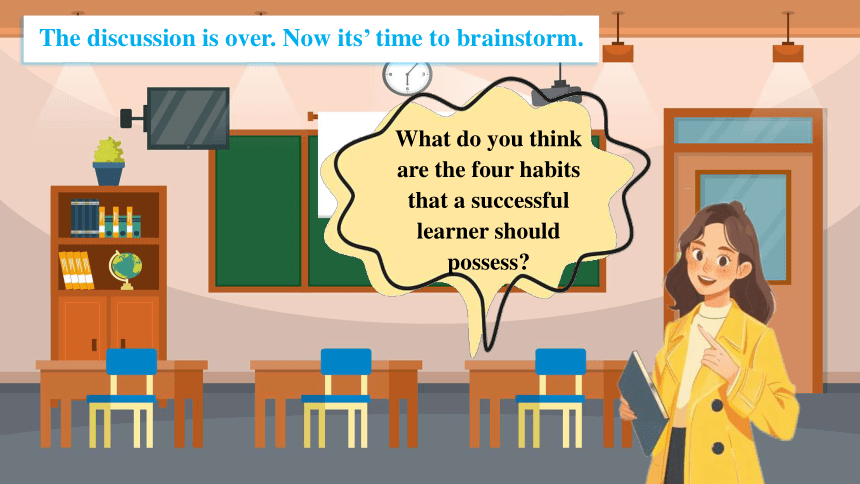
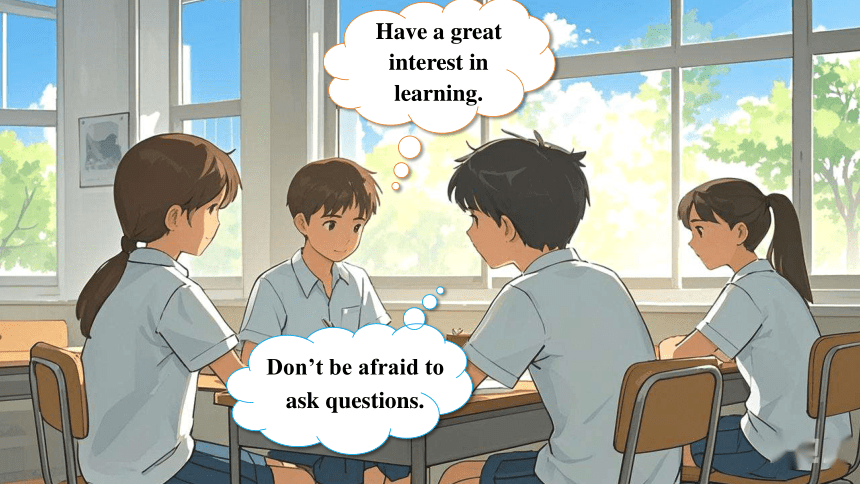
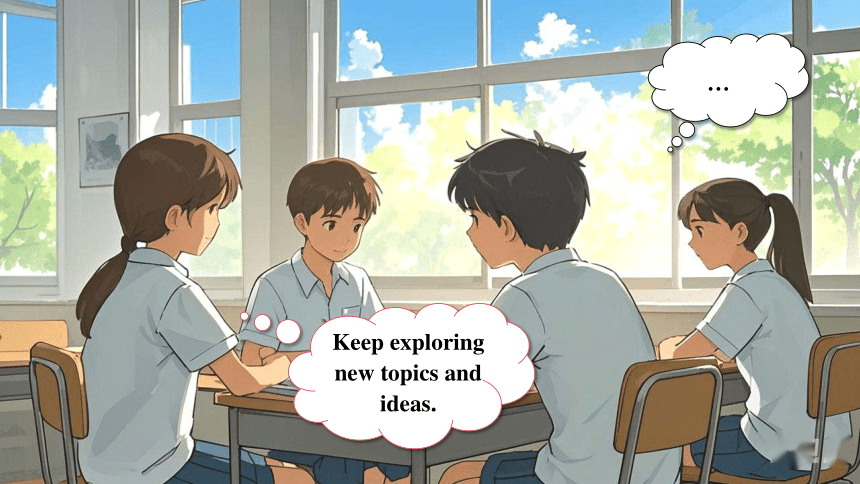
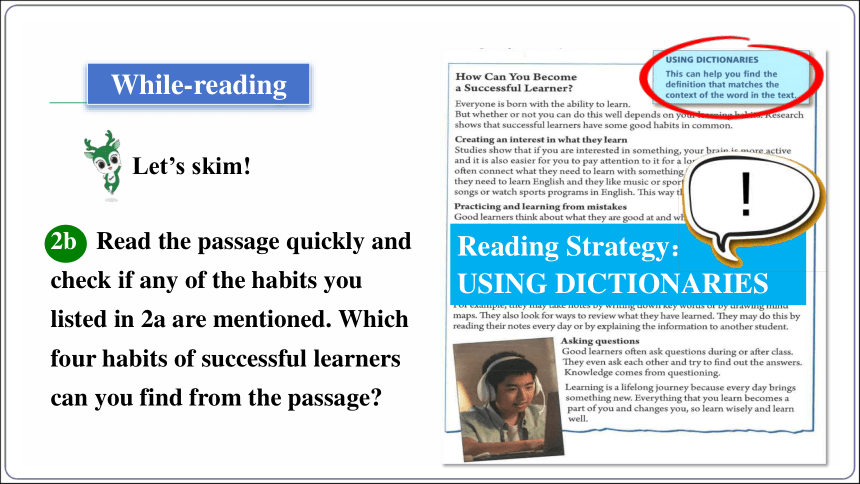
文档简介
(共59张PPT)
九全英语同步课件
教学课件
(人教版九年级
全
2025-2026学年人教九全英语情境课堂教学课件
Unit 1 How can we become good learners
Section B 2a~2e
主题情境·主题班会
——如何才能成为优秀的学习者?
目 录
Warming Up
2
Reading
3
Exercises
4
Learning Objectives
1
Summary & Homework
5
At the end of the class, we are able to:
1. talk about good learning habits; (Language ability)
2. read the passage and learn how to be a successful learner;
(Learning ability)
3. choose effective learning methods based on our own reality, and cultivate
good learning habits; (Quality of thinking)
4. realize the importance of the lifelong learning. (Cultural awareness)
Learning Objectives
Warming Up
CLASS MEETING——How can we become good learners
Now, let’s think and list the good learning habits you know.
Go over what you’ve learned often to remember it.
Plan regular study time.
Have clear goals for what you want to learn.
2a What good learning habits can you think of Make a list and discuss them with your partner.
Pre-reading
Now, let’s have a look at some habits. Do you think they are good habits or not
be active in thinking
pay too much attention to the knowledge of grammar
connect something new with knowledge and experience you already have
review well what you have learned
lack concentration in class or when doing homework
feel nervous about making mistakes
What do you think are the four habits that a successful learner should possess
The discussion is over. Now its’ time to brainstorm.
Have a great interest in learning.
Don’t be afraid to ask questions.
Keep exploring new topics and ideas.
…
Reading Strategy:
USING DICTIONARIES
While-reading
Let’s skim!
2b Read the passage quickly and check if any of the habits you listed in 2a are mentioned. Which four habits of successful learners can you find from the passage
Creating an interest in what
they learn
Practicing and learning from
mistakes
Developing their study skills
Asking questions
Check your answers!
The ways to become a successful learner.
Look at the passage and the subtitle of the article.
【What】What’s the passage talk about
Let’s scan!
【How】What is the structure of the passage
Para.6
Para. 2~5
Subtitle
Check your answers!
Part 2
Part 3
Para. 1
Part 1
Pay attention to the structure when you read a passage next time!
Part 1 (Para. 1):
Show us the opinion(论点)
Part 2 (Para. 2~5):
Show us the arguments(论据)
Part 3 (Para. 6):
Draw a conclusion(结论)
【What】What are the three parts of the article talking about
Creating an interest in what they learn
Practicing and learning from mistakes
Developing their study skills
Asking questions
These are the four habits that a successful learner should have.
Now, let’s discuss why these four habits can help us become good learners.
2c Read the passage again and answer the questions.
1. Does the writer think that everyone is born with the ability to learn well Do you agree Why or why not
2. Why is it a good idea to connect something you need to learn with something you are interested in
3. What do the sayings “Use it or lose it” and “Practice makes perfect” mean
Do you agree with them
4. Do good learners learn from mistakes, or are they afraid of making mistakes
5. What study skills does the writer talk about Do you have those study skills
6. Do you agree that learning is a lifelong journey Why or why not
Check your answers!
1. Does the writer think that everyone is born with the ability to learn well Do you agree Why or why not
The author believes that everyone is born with the ability to learn. I agree with him/her because whether one succeeds or not depends on his/her learning habits.
2. Why is it a good idea to connect something you need to learn with something you are interested in
Because if you are interested in something, your brain is more active and it is also easier for you to pay attention to it for a long time.
3. What do the sayings “Use it or lose it” and “Practice makes perfect” mean Do you agree with them
4. Do good learners learn from mistakes, or are they afraid of making mistakes
要么使用它,要么失去它。
熟能生巧。
Yes, I agree.
They learn from mistakes.
5. What study skills does the writer talk about Do you have those study skills
① Taking notes by writing down key words or by drawing mind maps. ② Looking for ways to review what we have learned, and doing this by reading our notes every day or by explaining the information to another student.
Yes, I agree. Learning is lifelong because we constantly gain new knowledge and skills from experiences throughout our lives.
Do you agree that learning is a lifelong
journey Why or why not
brain n. connect v. overnight adv.
attention n. review v. knowledge n.
ability n. active adj. wisely adv.
Here are a few words that appear frequently in discussions.
2d Look up the following words from the passage in the dictionary. Then write a sentence for each word.
e.g. brain: A good way to train the brain is to do some math exercises every day.
brain n. connect v. overnight adv.
attention n. review v. knowledge n.
ability n. active adj. wisely adv.
Thank you all for your active participation. And I have a question for you.
The class meeting is coming to an end.
Do you think you are a good learner
And why
Useful Expressions:
I think …
In my opinion, …
In my point of view, …
I hold that …
As far as I am concerned …
2e Do you think you are a good learner What learning habits do you think are useful Discuss with you group and share your ideas with the class.
I think I am a good learner. The useful learning habit is trying to think about the same thing in different ways. It’s important to...
Learning is a lifelong journey.
It’s not enough to just study hard.
We need to develop good learning habits and study skills to learn wisely and efficiently.
Language Points
How Can You Become a Successful Learner
Everyone is born with the ability to learn. But whether or not you can do this well depends on your learning habits. Research shows that successful learners have some good habits in common.
adj. /b (r)n/
born&ability的用法
Point 1
depend on
Point 2
Point 3
have sth. in common (with sb.)
(与某人)有共同点
n. / b l ti/
Creating an interest in what they learn
Studies show that if you are interested in something, your brain is more active and
it is also easier for you to pay attention to it for a long time. Good learners often connect what they
need to learn with something interesting. For example, if they need to learn English and they like music or sports, they can listen to English songs or watch sports programs in English. This way they will not get bored.
n. /bre n/
adj. / kt v/
pay attention to
Point 5
connect...with
Point 6
Point 7
if 引导的条件状语从句,当主句有情态动词can, may, must, need等时,从句常用一般现在时。(主情从现)
create v. /kri e t/
n. / ten n/
v. /k nekt/
create的用法
Point 4
Practicing and learning from mistakes
Good learners think about what they are good at and what they need to practice more. Remember “use it or lose it! Even if you learn something well, you will forget it unless you use it. ” Practice makes perfect.”
Point 8
even if 引导让步状语从句
Point 9
unless 引导条件状语从句
Point 10
Practice makes perfect. 熟能生巧。
Good learners will keep practicing what they have learned, and they are not afraid of making mistakes. Alexander Graham Bell did not invent the telephone overnight. He
succeeded by trying many times and learning from his mistakes.
adv. / v na t/
Point 11
keep (on) doing sth. 继续做某事
Point 12
be (not)afraid of doing sth. (不)害怕做某事
Point 13
拓展:succeed in doing sth.
成功地做某事
Point 14
learn (sth.) from sb./sth.
向某人/某事学习(某事)
Developing their study skills
It is not enough to just study hard. Good learners know the best way they can study. For example, they may take notes by writing down key words or by drawing mind maps. They also look for ways to review what they have learned. They may do this by reading their notes every day or by explaining the information to another student.
Point 15
it is + adj. +to do sth. 做某事是……
Point 16
拓展:write in/on/with sth.
Point 17
draw mind maps 绘制思维导图
Point 18
explain sth. to sb. 向某人解释某事
Asking questions
Good learners often ask questions during or after class. They even ask each other and try to find out the answers. Knowledge comes from questioning.
n. / n l d /, / nɑ l d /
[U, sing.]
Point 19
find out 找出,查明
Point 20
拓展:
to your knowledge 据你所知
Learning is a lifelong journey because every day brings something new. Everything that you learn becomes a part of you and changes you, so learn wisely and learn well.
adj. / la fl /
adv. / wa zli/
Point 21
lifelong learning 终身学习
Click to do exercise!
1. Everyone is born with the ability to learn.
(1) born n./ v. 出生;诞生;产生(仅用于被动语态);
(动词 bear 的过去分词)出生 adj. 天生的
be born in/on 等,表示 “出生的地点/时间”
be born with sth. 表示 “生来就有某种疾病/性格等”
be born to be/do sth.,表示 “注定会成为;注定要做”
(2) ability n. 能力;才能
disability (反义词)无能力;残疾;残缺
have/lose the ability to do 拥有/失去做某事的能力
(= be/be not able to do sth.)
他有能力激发别人最好的一面。
He __________________ bring out the best in others.
has the ability to
①Andy _________________ a gift for music.
②My friend Judy _________________ Milan on April 29, 1923.
③The man _________________ a great composer.
be born in be born with be born to be/do
1. 选择合适的短语填空
was born with
was born in
was born to be
2. Sam’s animal sign is the Tiger. It is said that people born ______ the Year of the Tiger are brave.
A. in B. with C. at D. to
3. 那个男孩天生记忆力就很好。
_________________________________________________
4. 如果你技术娴熟,你就有能力表现出色。
If you are skilled, you __________________________ well.
The boy was born with a good memory.
返回
have the ability to perform
A
2. But whether or not you can do this well depends on your
learning habits.
depend on/upon 依靠;依赖
depend on/upon sb. to do sth. 依靠某人做某事
It/That depends. (口) 看情况,视情况而定
e.g. The man has a wife and family depending on him.
这个男人有妻儿老小要抚养。
完成句子
1. —先生,我应该选择哪辆自行车?
—这取决于你想用它做什么。
—Which bicycle should I choose, sir
—It ___________ _______ what you want to use it for.
2. —你觉得明天天气会好吗? —这得看情况。
—Do you think the weather will be nice tomorrow
— ________ __________.
返回
depends on
It depends
4. Creating an interest in what they learn
辨析 create, discover, invent与find
词汇 含义 用法
create 创造;创建 表示创作出原本不存在的东西,如艺术品、理论等。
discover 发现;发觉 表示发现本就存在但尚未被人发现的地点或事物。
invent 发明;创造 指通过研究和实验发明出前所未有的东西。
词汇 含义 用法
find 找到; 发现 作“发现”时,指发现已存在但以前不知道的事物;作“找到”时,指找到了所寻找的东西,知道了其下落,强调寻找的结果。
图解助记
用方框中所给的词填空
create discover find invent
There are many creative people in the world. Explorers(探索者) ① discover new land to increase the space for human activities. Artists can ② create many artworks to make people’s lives colorful. Scientists ③ invenenent machines to make people’s lives more convenient. Some common people turn waste into beautiful artworks to make a difference to the environment. And it is important for us teenagers to have a creative mind and ④ enenenennd more possibilities to do something for our country.
discover
create
invent
find
返回
5. It is also easier for you to pay attention to it for a long time.
pay attention to 关注;注意 (固定搭配)
to 为介词,其后可以跟名词、代词或动名词。
拓展:其他常见的短语中带介词to的有:
look forward to 盼望
be used to 习惯于
1. 老师让我们注意拼写英语单词。
The teacher told us to _______ _________ ______ __________ English words.
2. 这封信使大量的读者注意到了他们。
The letter made a large number of readers _______ _________ ______ _______.
pay attention to spelling
返回
pay attention
完成句子
to them
6. Good learners often connect what they need to learn with
something interesting.
connect v. (使)连接;与……有联系
connect A with B 把A和B连接/联系起来
connect A to B 将A连到B
派生词 connection n. (关系;连接)
have a close connection with... 和……有密切联系
e.g. The canal was built to connect the city with the countryside.
修建这条运河是为了将城市和乡村连接起来。
You can connect the speakers to your CD player.
你可以将这些扬声器与你的激光唱机连接起来。
We want to have a connection with China.
我们想和中国保持一种关系。
1. A good student often __________ what he is learning ______ past experiences.
2. You can __________ your telephone ______ the computer to share the pictures.
connects
返回
with
connect
to
connect A to B connect A with B
选择合适的短语填空
一、根据首字母提示写出单词。
1.(2025云南改编)Teenagers are supposed to spend their money w_______.
2.(2024湖北改编)As the saying goes, “K__________ starts with practice”.
3. A good student often c________ what he reads with what he sees
around him.
4. Simon has a special a________ to write with two hands at the same time.
5. Learning is a l_______ journey because it brings something new every day.
onnects
nowledge
bility
ifelong
Exercises
isely
二、完成句子。
1.(2024四川改编) 戴安娜不确定贝蒂是否会来。
Diana isn’t sure _________ Betty will _______ _______ _______.
2.(2024重庆改编) 虽然不同的人可能有不同的幽默感,但好的幽默有一些共同点。
Although different people may have a different sense of humor, good humor ________ something ________ _________.
3. 对你来说,从错误中学习是一个重要的方法。
It’s an important way for you _______ _______ _______ mistakes.
to learn from
whether come or not
has in common
4. 他们经常把需要学习的内容与有趣的事情联系起来。
They often _________ what they need to learn _______ something interesting.
5. 每个人天生具有学习的能力。
Everyone _______ _______ _______ the ability to learn.
is born with
connect with
1. Passage: Understand explanatory articles(说明类文章) on learning methods.
2. Words and Expressions: born, ability, create, brain, active, attention, connect, overnight, knowledge, lifelong, wisely, be born with, pay attention to, connect...with..., depend on /pay attention to/ even if /unless
Summary
Summarize useful learning habits and make a list.
Homework
https://www.21cnjy.com/recruitment/home/fine
九全英语同步课件
教学课件
(人教版九年级
全
2025-2026学年人教九全英语情境课堂教学课件
Unit 1 How can we become good learners
Section B 2a~2e
主题情境·主题班会
——如何才能成为优秀的学习者?
目 录
Warming Up
2
Reading
3
Exercises
4
Learning Objectives
1
Summary & Homework
5
At the end of the class, we are able to:
1. talk about good learning habits; (Language ability)
2. read the passage and learn how to be a successful learner;
(Learning ability)
3. choose effective learning methods based on our own reality, and cultivate
good learning habits; (Quality of thinking)
4. realize the importance of the lifelong learning. (Cultural awareness)
Learning Objectives
Warming Up
CLASS MEETING——How can we become good learners
Now, let’s think and list the good learning habits you know.
Go over what you’ve learned often to remember it.
Plan regular study time.
Have clear goals for what you want to learn.
2a What good learning habits can you think of Make a list and discuss them with your partner.
Pre-reading
Now, let’s have a look at some habits. Do you think they are good habits or not
be active in thinking
pay too much attention to the knowledge of grammar
connect something new with knowledge and experience you already have
review well what you have learned
lack concentration in class or when doing homework
feel nervous about making mistakes
What do you think are the four habits that a successful learner should possess
The discussion is over. Now its’ time to brainstorm.
Have a great interest in learning.
Don’t be afraid to ask questions.
Keep exploring new topics and ideas.
…
Reading Strategy:
USING DICTIONARIES
While-reading
Let’s skim!
2b Read the passage quickly and check if any of the habits you listed in 2a are mentioned. Which four habits of successful learners can you find from the passage
Creating an interest in what
they learn
Practicing and learning from
mistakes
Developing their study skills
Asking questions
Check your answers!
The ways to become a successful learner.
Look at the passage and the subtitle of the article.
【What】What’s the passage talk about
Let’s scan!
【How】What is the structure of the passage
Para.6
Para. 2~5
Subtitle
Check your answers!
Part 2
Part 3
Para. 1
Part 1
Pay attention to the structure when you read a passage next time!
Part 1 (Para. 1):
Show us the opinion(论点)
Part 2 (Para. 2~5):
Show us the arguments(论据)
Part 3 (Para. 6):
Draw a conclusion(结论)
【What】What are the three parts of the article talking about
Creating an interest in what they learn
Practicing and learning from mistakes
Developing their study skills
Asking questions
These are the four habits that a successful learner should have.
Now, let’s discuss why these four habits can help us become good learners.
2c Read the passage again and answer the questions.
1. Does the writer think that everyone is born with the ability to learn well Do you agree Why or why not
2. Why is it a good idea to connect something you need to learn with something you are interested in
3. What do the sayings “Use it or lose it” and “Practice makes perfect” mean
Do you agree with them
4. Do good learners learn from mistakes, or are they afraid of making mistakes
5. What study skills does the writer talk about Do you have those study skills
6. Do you agree that learning is a lifelong journey Why or why not
Check your answers!
1. Does the writer think that everyone is born with the ability to learn well Do you agree Why or why not
The author believes that everyone is born with the ability to learn. I agree with him/her because whether one succeeds or not depends on his/her learning habits.
2. Why is it a good idea to connect something you need to learn with something you are interested in
Because if you are interested in something, your brain is more active and it is also easier for you to pay attention to it for a long time.
3. What do the sayings “Use it or lose it” and “Practice makes perfect” mean Do you agree with them
4. Do good learners learn from mistakes, or are they afraid of making mistakes
要么使用它,要么失去它。
熟能生巧。
Yes, I agree.
They learn from mistakes.
5. What study skills does the writer talk about Do you have those study skills
① Taking notes by writing down key words or by drawing mind maps. ② Looking for ways to review what we have learned, and doing this by reading our notes every day or by explaining the information to another student.
Yes, I agree. Learning is lifelong because we constantly gain new knowledge and skills from experiences throughout our lives.
Do you agree that learning is a lifelong
journey Why or why not
brain n. connect v. overnight adv.
attention n. review v. knowledge n.
ability n. active adj. wisely adv.
Here are a few words that appear frequently in discussions.
2d Look up the following words from the passage in the dictionary. Then write a sentence for each word.
e.g. brain: A good way to train the brain is to do some math exercises every day.
brain n. connect v. overnight adv.
attention n. review v. knowledge n.
ability n. active adj. wisely adv.
Thank you all for your active participation. And I have a question for you.
The class meeting is coming to an end.
Do you think you are a good learner
And why
Useful Expressions:
I think …
In my opinion, …
In my point of view, …
I hold that …
As far as I am concerned …
2e Do you think you are a good learner What learning habits do you think are useful Discuss with you group and share your ideas with the class.
I think I am a good learner. The useful learning habit is trying to think about the same thing in different ways. It’s important to...
Learning is a lifelong journey.
It’s not enough to just study hard.
We need to develop good learning habits and study skills to learn wisely and efficiently.
Language Points
How Can You Become a Successful Learner
Everyone is born with the ability to learn. But whether or not you can do this well depends on your learning habits. Research shows that successful learners have some good habits in common.
adj. /b (r)n/
born&ability的用法
Point 1
depend on
Point 2
Point 3
have sth. in common (with sb.)
(与某人)有共同点
n. / b l ti/
Creating an interest in what they learn
Studies show that if you are interested in something, your brain is more active and
it is also easier for you to pay attention to it for a long time. Good learners often connect what they
need to learn with something interesting. For example, if they need to learn English and they like music or sports, they can listen to English songs or watch sports programs in English. This way they will not get bored.
n. /bre n/
adj. / kt v/
pay attention to
Point 5
connect...with
Point 6
Point 7
if 引导的条件状语从句,当主句有情态动词can, may, must, need等时,从句常用一般现在时。(主情从现)
create v. /kri e t/
n. / ten n/
v. /k nekt/
create的用法
Point 4
Practicing and learning from mistakes
Good learners think about what they are good at and what they need to practice more. Remember “use it or lose it! Even if you learn something well, you will forget it unless you use it. ” Practice makes perfect.”
Point 8
even if 引导让步状语从句
Point 9
unless 引导条件状语从句
Point 10
Practice makes perfect. 熟能生巧。
Good learners will keep practicing what they have learned, and they are not afraid of making mistakes. Alexander Graham Bell did not invent the telephone overnight. He
succeeded by trying many times and learning from his mistakes.
adv. / v na t/
Point 11
keep (on) doing sth. 继续做某事
Point 12
be (not)afraid of doing sth. (不)害怕做某事
Point 13
拓展:succeed in doing sth.
成功地做某事
Point 14
learn (sth.) from sb./sth.
向某人/某事学习(某事)
Developing their study skills
It is not enough to just study hard. Good learners know the best way they can study. For example, they may take notes by writing down key words or by drawing mind maps. They also look for ways to review what they have learned. They may do this by reading their notes every day or by explaining the information to another student.
Point 15
it is + adj. +to do sth. 做某事是……
Point 16
拓展:write in/on/with sth.
Point 17
draw mind maps 绘制思维导图
Point 18
explain sth. to sb. 向某人解释某事
Asking questions
Good learners often ask questions during or after class. They even ask each other and try to find out the answers. Knowledge comes from questioning.
n. / n l d /, / nɑ l d /
[U, sing.]
Point 19
find out 找出,查明
Point 20
拓展:
to your knowledge 据你所知
Learning is a lifelong journey because every day brings something new. Everything that you learn becomes a part of you and changes you, so learn wisely and learn well.
adj. / la fl /
adv. / wa zli/
Point 21
lifelong learning 终身学习
Click to do exercise!
1. Everyone is born with the ability to learn.
(1) born n./ v. 出生;诞生;产生(仅用于被动语态);
(动词 bear 的过去分词)出生 adj. 天生的
be born in/on 等,表示 “出生的地点/时间”
be born with sth. 表示 “生来就有某种疾病/性格等”
be born to be/do sth.,表示 “注定会成为;注定要做”
(2) ability n. 能力;才能
disability (反义词)无能力;残疾;残缺
have/lose the ability to do 拥有/失去做某事的能力
(= be/be not able to do sth.)
他有能力激发别人最好的一面。
He __________________ bring out the best in others.
has the ability to
①Andy _________________ a gift for music.
②My friend Judy _________________ Milan on April 29, 1923.
③The man _________________ a great composer.
be born in be born with be born to be/do
1. 选择合适的短语填空
was born with
was born in
was born to be
2. Sam’s animal sign is the Tiger. It is said that people born ______ the Year of the Tiger are brave.
A. in B. with C. at D. to
3. 那个男孩天生记忆力就很好。
_________________________________________________
4. 如果你技术娴熟,你就有能力表现出色。
If you are skilled, you __________________________ well.
The boy was born with a good memory.
返回
have the ability to perform
A
2. But whether or not you can do this well depends on your
learning habits.
depend on/upon 依靠;依赖
depend on/upon sb. to do sth. 依靠某人做某事
It/That depends. (口) 看情况,视情况而定
e.g. The man has a wife and family depending on him.
这个男人有妻儿老小要抚养。
完成句子
1. —先生,我应该选择哪辆自行车?
—这取决于你想用它做什么。
—Which bicycle should I choose, sir
—It ___________ _______ what you want to use it for.
2. —你觉得明天天气会好吗? —这得看情况。
—Do you think the weather will be nice tomorrow
— ________ __________.
返回
depends on
It depends
4. Creating an interest in what they learn
辨析 create, discover, invent与find
词汇 含义 用法
create 创造;创建 表示创作出原本不存在的东西,如艺术品、理论等。
discover 发现;发觉 表示发现本就存在但尚未被人发现的地点或事物。
invent 发明;创造 指通过研究和实验发明出前所未有的东西。
词汇 含义 用法
find 找到; 发现 作“发现”时,指发现已存在但以前不知道的事物;作“找到”时,指找到了所寻找的东西,知道了其下落,强调寻找的结果。
图解助记
用方框中所给的词填空
create discover find invent
There are many creative people in the world. Explorers(探索者) ① discover new land to increase the space for human activities. Artists can ② create many artworks to make people’s lives colorful. Scientists ③ invenenent machines to make people’s lives more convenient. Some common people turn waste into beautiful artworks to make a difference to the environment. And it is important for us teenagers to have a creative mind and ④ enenenennd more possibilities to do something for our country.
discover
create
invent
find
返回
5. It is also easier for you to pay attention to it for a long time.
pay attention to 关注;注意 (固定搭配)
to 为介词,其后可以跟名词、代词或动名词。
拓展:其他常见的短语中带介词to的有:
look forward to 盼望
be used to 习惯于
1. 老师让我们注意拼写英语单词。
The teacher told us to _______ _________ ______ __________ English words.
2. 这封信使大量的读者注意到了他们。
The letter made a large number of readers _______ _________ ______ _______.
pay attention to spelling
返回
pay attention
完成句子
to them
6. Good learners often connect what they need to learn with
something interesting.
connect v. (使)连接;与……有联系
connect A with B 把A和B连接/联系起来
connect A to B 将A连到B
派生词 connection n. (关系;连接)
have a close connection with... 和……有密切联系
e.g. The canal was built to connect the city with the countryside.
修建这条运河是为了将城市和乡村连接起来。
You can connect the speakers to your CD player.
你可以将这些扬声器与你的激光唱机连接起来。
We want to have a connection with China.
我们想和中国保持一种关系。
1. A good student often __________ what he is learning ______ past experiences.
2. You can __________ your telephone ______ the computer to share the pictures.
connects
返回
with
connect
to
connect A to B connect A with B
选择合适的短语填空
一、根据首字母提示写出单词。
1.(2025云南改编)Teenagers are supposed to spend their money w_______.
2.(2024湖北改编)As the saying goes, “K__________ starts with practice”.
3. A good student often c________ what he reads with what he sees
around him.
4. Simon has a special a________ to write with two hands at the same time.
5. Learning is a l_______ journey because it brings something new every day.
onnects
nowledge
bility
ifelong
Exercises
isely
二、完成句子。
1.(2024四川改编) 戴安娜不确定贝蒂是否会来。
Diana isn’t sure _________ Betty will _______ _______ _______.
2.(2024重庆改编) 虽然不同的人可能有不同的幽默感,但好的幽默有一些共同点。
Although different people may have a different sense of humor, good humor ________ something ________ _________.
3. 对你来说,从错误中学习是一个重要的方法。
It’s an important way for you _______ _______ _______ mistakes.
to learn from
whether come or not
has in common
4. 他们经常把需要学习的内容与有趣的事情联系起来。
They often _________ what they need to learn _______ something interesting.
5. 每个人天生具有学习的能力。
Everyone _______ _______ _______ the ability to learn.
is born with
connect with
1. Passage: Understand explanatory articles(说明类文章) on learning methods.
2. Words and Expressions: born, ability, create, brain, active, attention, connect, overnight, knowledge, lifelong, wisely, be born with, pay attention to, connect...with..., depend on /pay attention to/ even if /unless
Summary
Summarize useful learning habits and make a list.
Homework
https://www.21cnjy.com/recruitment/home/fine
同课章节目录
- Unit 1 How can we become good learners.
- Section A
- Section B
- Unit 2 I think that mooncakes are delicious!
- Section A
- Section B
- Unit 3 Could you please tell me where the restroom
- Section A
- Section B
- Unit 4 I used to be afraid of the dark.
- Section A
- Section B
- Unit 5 What are the shirts made of?
- Section A
- Section B
- Review of Units 1-5
- Unit 6 When was it invented?
- Section A
- Section B
- Unit 7 Teenagers should be allowed to choose their
- Section A
- Section B
- Unit 8 It must belong to Carla.
- Section A
- Section B
- Unit 9 I like music that I can dance to.
- Section A
- Section B
- Unit 10 You're supposed to shake hands.
- Section A
- Section B
- Review of Units 6-10
- Unit 11 Sad movies make me cry.
- Section A
- Section B
- Unit 12 Life is full of the unexpected
- Section A
- Section B
- Unit 13 We're trying to save the earth!
- Section A
- Section B
- Unit 14 I remember meeting all of you in Grade 7.
- Section A
- Section B
- Review of Units 11-14
